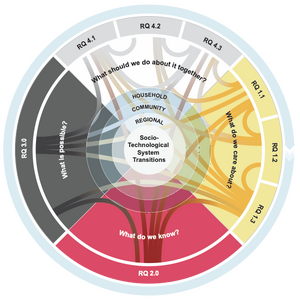
Solar photovoltaic (PV) energy technology can play a key role in decreasing the amount of carbon emissions associated with electrical energy production, while also providing an economically justifiable alternative to fossil fuel production. Solar energy technology is also extremely flexible in terms of the size and siting of technological development. Large scale PV farms, however, require access to large tracts of land, which can create community-scale conflict over siting solar energy development projects. While previous scholarship offers frameworks for understanding the mechanisms at play in socio-technological system transitions, including the renewable energy transition, those frameworks fail to center community priorities, values, and concerns, and therefore often do not provide an effective means of addressing community conflict over solar siting. This paper provides a conceptual exploration of how a proposed framework can guide decision making for solar development across multiple scales and settings, while also illuminating the potential barriers and bottlenecks that may limit the potential of solar energy development to occur in scales and forms that receive community acceptance and at the pace necessary to address the greenhouse gas emissions currently contributing to the rapidly changing global climate.
Keywords[edit | edit source]
Energy decision making; energy transitions; sustainability; community; energy democracy; energy security; energy sovereignty ; Energy justice; Environmental justice; Energy policy; Electric utility; Photovoltaic; Distributed generation; Solar energy
See also[edit | edit source]
- Energy Policy for Energy Sovereignty: Can policy tools enhance energy sovereignty?
- The energy crises revealed by COVID: Intersections of Indigeneity, inequity, and health
- Emerging economic viability of grid defection in a northern climate using solar hybrid systems
- The Potential for Grid Defection of Small and Medium Sized Enterprises Using Solar Photovoltaic, Battery and Generator Hybrid Systems
- Policies to Overcome Barriers for Renewable Energy Distributed Generation: A Case Study of Utility Structure and Regulatory Regimes in Michigan
- Examining interconnection and net metering policy for distributed generation in the United States
- A review of the value of solar methodology with a case study of the U.S. VOS
- http://www.utilityratewatch.org/





